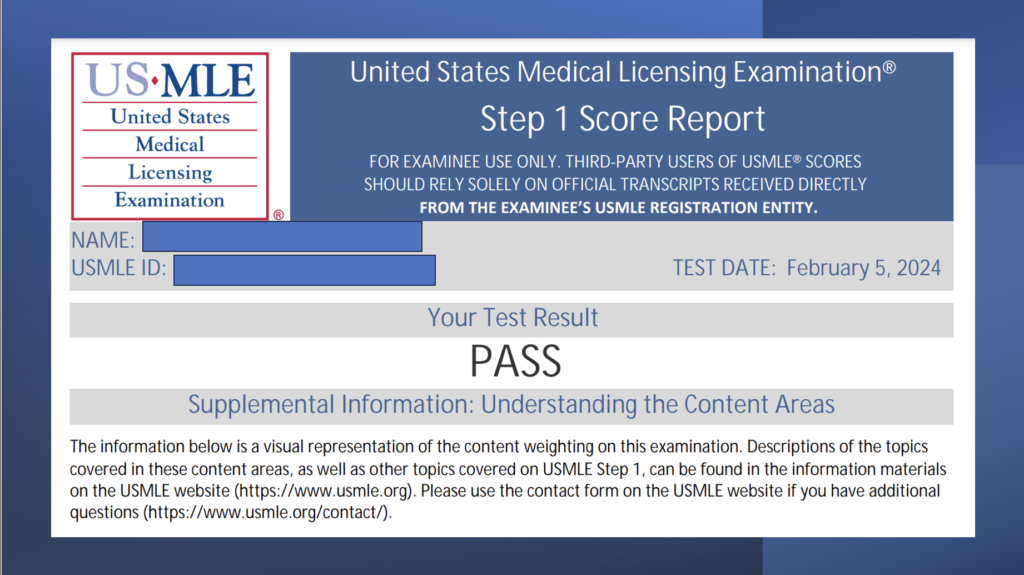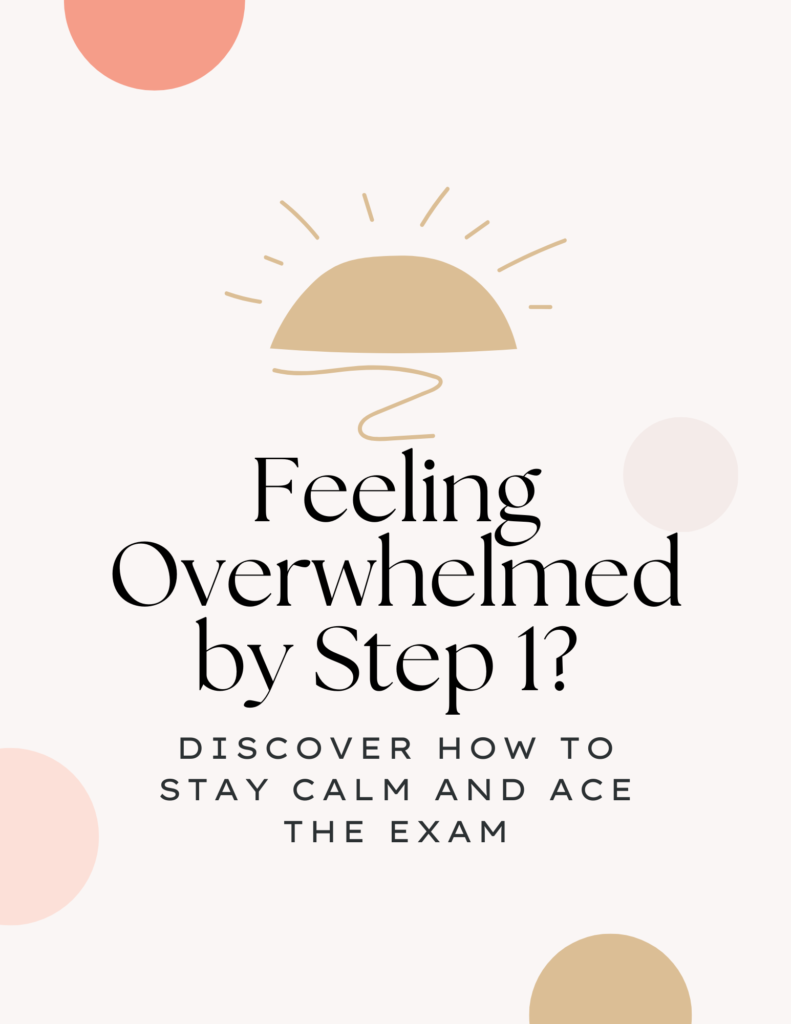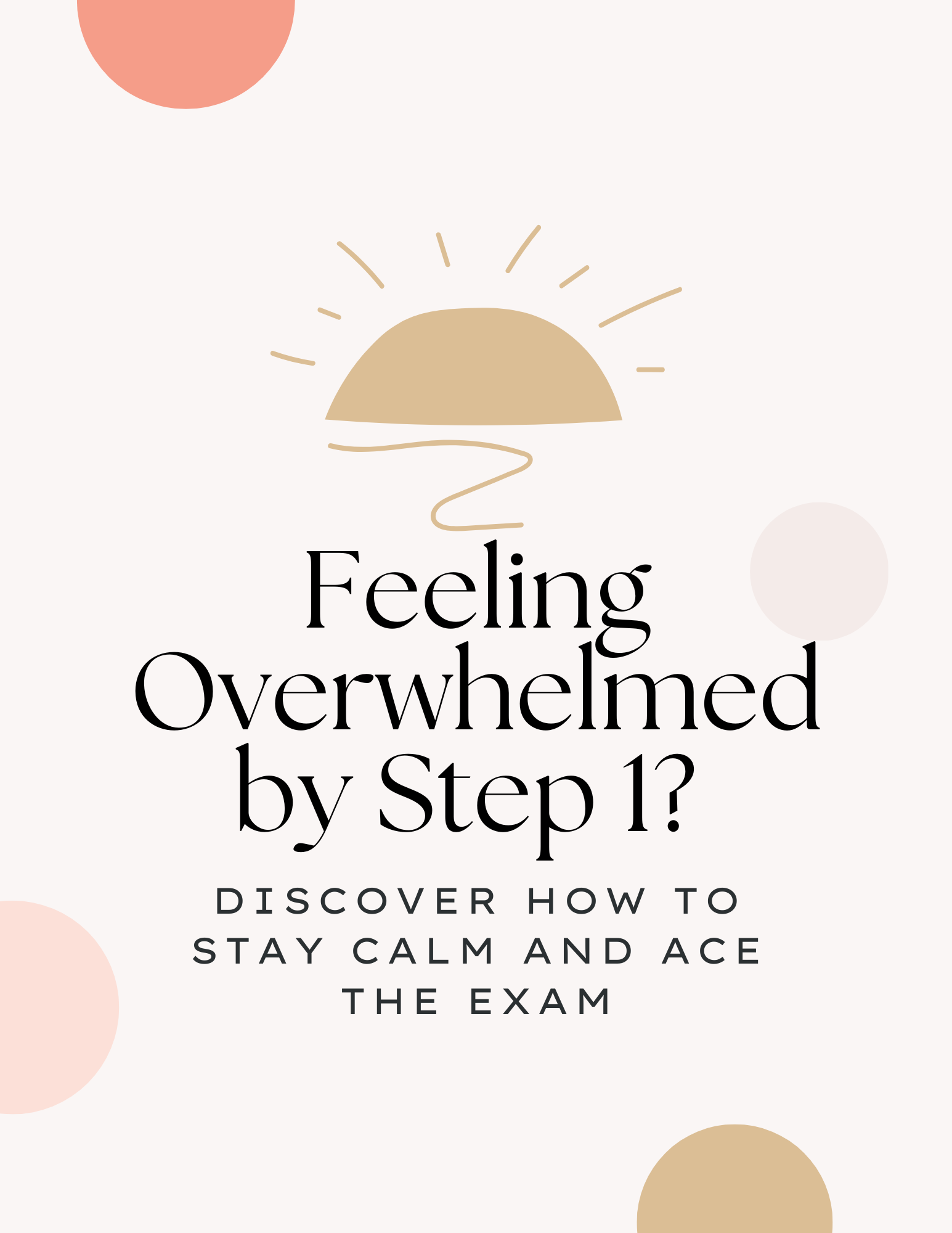The USMLE Step 1 Exam is one of the first major tests in your medical education. Passing this exam signifies a strong foundation in medical knowledge and is crucial in progressing in your medical journey. Some may feel it is “made easier” because it is now Pass/Fail, but preliminary stats released show us that pass rates are much lower in recent years (down from 97% in 2020 to 91% in 2022).
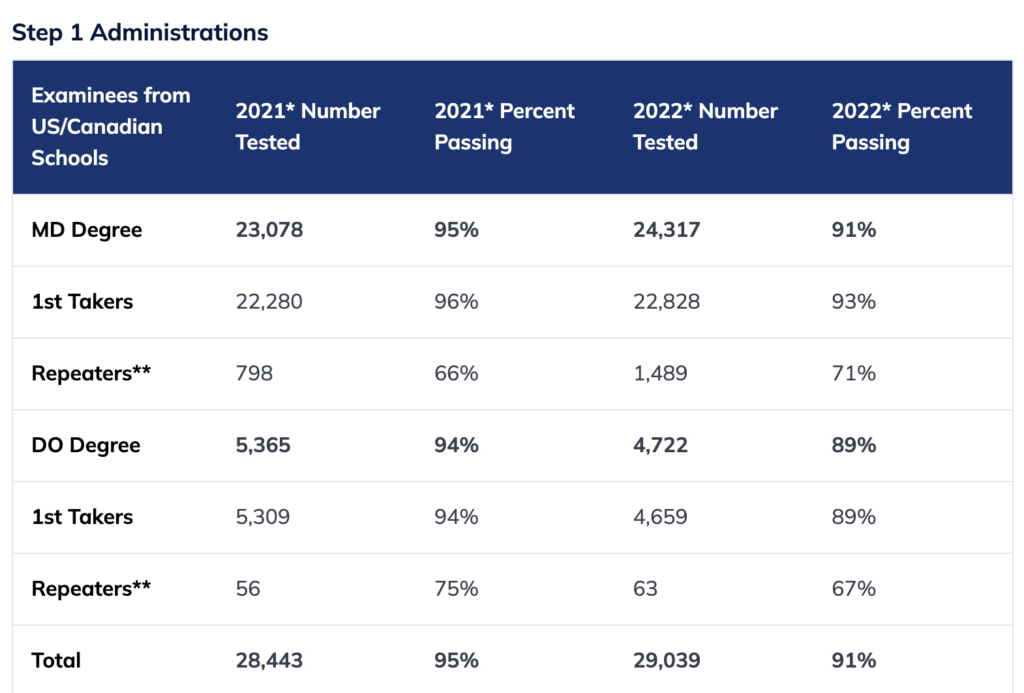
https://www.usmle.org/performance-data
In this post, I will walk through my top strategies and tips on how I passed with confidence in ~5 weeks. One of the biggest issues I struggle with is maintaining momentum and getting too overwhelmed. Here I’ll share my strategies for dealing with both. I even got very sick for a whole week and managed to get back on track! This post is not sponsored at all and is purely just my personal opinion and what I did.
Pre-Dedicated Study (Optional)
Pre-dedicated?!?! What?!?! Don’t worry, this step is optional. Plenty of people pass Step 1 without doing anything before dedicated. But, if you can, here are a few tips that will help lighten your load for dedicated.
- Set up your study schedule: My school allowed for ~9 possible weeks of dedicated study from mid-December to mid-February. I chose to study for 5 weeks, taking the other 4 as personal vacation time. I broke my study schedule down into blocks by system with plenty of review and rest time each day. I took a full day off each week and did NBME tests every weekend. I also tracked my motivation, how many Anki cards I did, and if I exercised.
- Gather your resources, but don’t get lost in the sauce: There are way too many resources that are out there and honestly, you’re never going to know for sure if you have the perfect combo. Obsessing over finding the perfect resources wastes precious time and although your friends are going to gush about how amazing this one resource they found is, don’t be tempted to overwhelm yourself. Don’t get lost in the sauce.
- Resources I Used Every Day: AMBOSS, Anki, Sketchy
- Resources I Used PRN: First Aid, Pathoma, DirtyMedicine, Randy Neil
- Resources I Did NOT Use and I don’t regret it: Osmosis, Bootcamp, UWorld, Pixorize, Boards and Beyond
- Take a break before you start dedicated: Taking a mental break between the end of your curriculum and dedicated study is so important! I took the time to go and see family, keep school out of my mind, and focus on my health and wellbeing. It was well worth it.
- A note on pre-studying: At my school there was a popular program going around that helped students pre-study for several months before dedicated. Personally, I did not do this program and I feel like this was the best decision for me. I know some people also talk about working through pre-made Anki decks beforehand and that works well for them. I was not an Anki-lover during pre-clinical and decided not to use it for pre-dedicated. No regrets!
My Tier List of Study Resources 🙂
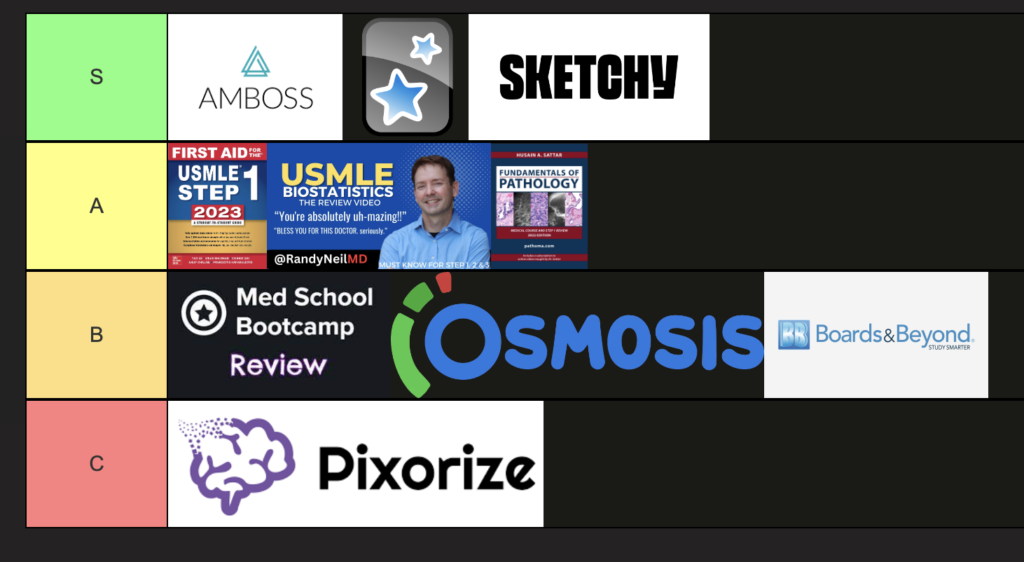
Dedicated Study Period
Time to crack open First Aid and buckle in for a long, slow road ahead.
- Start with questions: I know what you’re thinking, what if I get every single one wrong? Shouldn’t I do some light reading first? I don’t remember anything from cardio/GI/renal! Maybe I should rewatch a few videos at least… It’s okay, we all think that. Just start directly with the question bank. You’ll likely get quite a few wrong but trust the process – this is how you will learn!
- For my question bank I used AMBOSS because it was provided by my school. I absolutely loved the platform. I only did Hammer Levels 1-3 because Level 4 and 5 were way too hard and not representative of the exam, in my opinion. I did not use the “Hint” button and I did my question sets timed in blocks of 40.
- Develop a Mental Parking Lot: There is too much stuff for you to learn right now all at once!! You may feel overwhelmed and that’s normal. To combat this, develop a “Parking Lot” in your brain. Completely forgot about all the different types of ovarian tumors? Parking Lot! Don’t remember a thing about pulmonary function testing? Parking Lot! Learned the sympathomimetic drugs 10 months ago and don’t remember the Sketchy? Parking Lot! Then, at the end of your day, start going back and reviewing these big topics. The important thing is to keep momentum during your question review and for big high-hitters that you come across that you’ll need 30+ minutes on, put them in your mental Parking Lot and get to them when you’re done with question review.
- A common trap is people taking 5+ hours reviewing question sets because they spend too much time delving into details. Details are very important, but you’ll pick them up as you go. Trust that you will get to your parking lot.
- The mental Parking Lot is an exercise in prioritization, study strategy, and great tool for when your task feels larger than life. Highly recommend.
- If you like this technique, I also really like my “Thought Incinerator”. Sometimes I can ruminate about certain topics or catastrophize scenarios in my head. When I catch myself doing this, I just imagine taking the thought and putting it in my Incinerator. Really helps.
- Staying Focused: I deleted my social media and kept my phone off and in a drawer during Dedicated. Drastic, I know, but I have a problem with doom-scrolling sometimes. I also used a Pomodoro timer on days I wasn’t feeling focused or motivated. If I was feeling restless, I made sure to stretch or do yoga. At night, I took a melatonin gummy to help me fall asleep and stay asleep so I was well-rested the next day.
- NBME Practice Exams: I took 4 total practice exams and the Free 120. I set aside an entire day for each test, reviewed all the questions the next day, and took it under testing conditions (no distractions, timed, with earplugs etc.) For my last practice exam, I took it at my school in their testing center (very, very worth it!)
- Wellness and Balance: Keeping my mind and body healthy during dedicated was a top priority for me. I ate plenty of good healthy carbs, fruits and veggies, lean meats etc. I didn’t drink any alcohol. I had one cup of coffee each morning and one green tea in the afternoon. I did yoga a few times a week or went on long walks. I called my family at least once a week and I made time at the end of each day to fully turn my brain off. Your mental and physical wellbeing will dictate so much of this time period in your life!!! Healthy habits folks!!!
- A small sad side story: One of the things I love to do is read! But, because of how much reading and studying I was doing during Dedicated, I quickly became disgusted with reading. Opening a book felt like a chore and that made me very sad. By the end of Dedicated, I felt like reading a few sentences was torture. So instead, I had to find other hobbies like watching TV, talking on the phone with my fam, cooking etc. The good thing is I can read again and I’m a happy camper now 🙂
- Got behind? It is perfectly okay to get a few days behind. During Dedicated, I tested positive for COVID and was sick for 5 days. I was able to shift my study schedule around, cut out some topics that were lower yield, and get back on track. That’s the beauty of building in flex time in your study schedule!
- If your school has an academic coaching program for Step 1, stay in contact with them. I emailed my school’s academic coach at least once a week to check in. They were able to advise me whether or not I needed to adjust my timeline based on when I got behind.
- Give yourself time to recover and catch up. Take the rest if you need to.
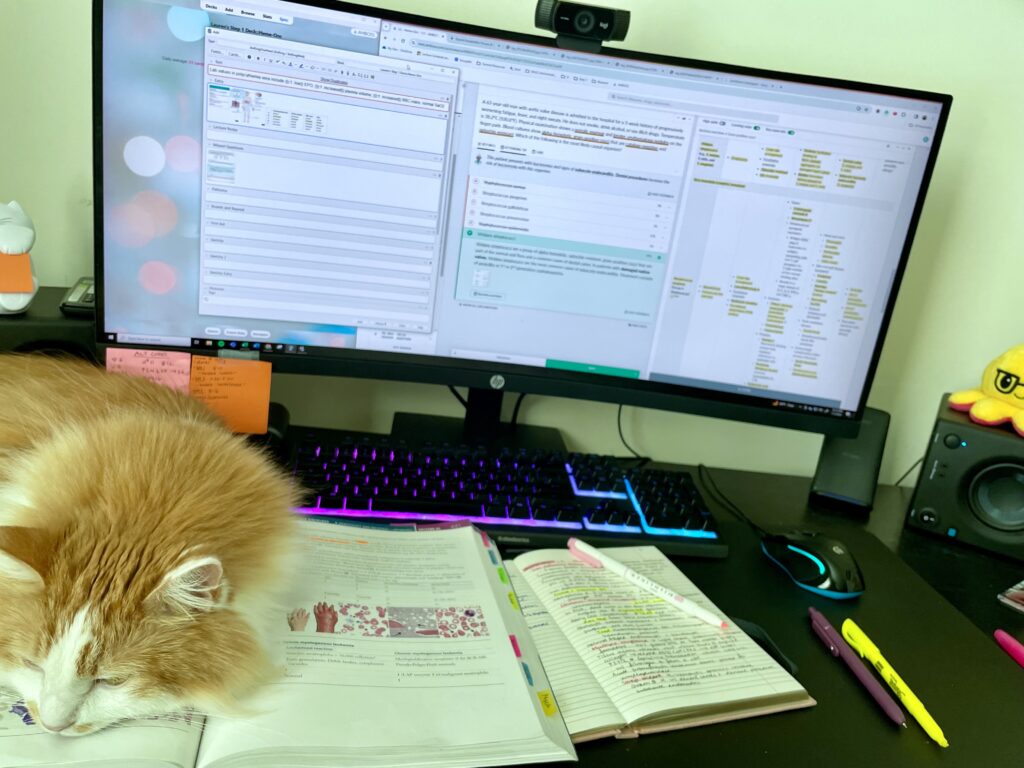
Hour-by-hour breakdown of how I studied
This was an average day for me, times are approximate, I took 5-10 minute breaks every hour! I also would get behind by 30min-1hr on many days. I just shifted my schedule accordingly and tried my best to keep going. Some days I couldn’t, and that’s okay.
- 6:30 AM: Wake up, coffee, walk my dog, etc.
- 7:00 AM: Shake off the sleepies, get my materials out for the day, start morning Anki ~100-300 cards
- 8:00 AM: Question block of 40 questions, timed, test-mode – I set a 60 minute timer! Practicing the pacing is important!
- 9:00 AM: Begin reviewing the questions. Go over each question and read the right answers and the wrong answers. I made 0-2 Anki cards for questions I got right and 1-5 Anki cards for questions I got wrong. I took screenshots of each question+explanation for the card and screenshots of any good diagrams in AMBOSS that I thought would be useful.
- I tried to spend ~1-3 minutes reviewing correct questions, and ~5-10 minutes reviewing incorrects
- If you spend more than 10-15 minutes on a question and you’re still not done, put it in your mental “Parking Lot” and move on!
- 11:00 AM: Lunch break 🙂 Maybe watch Sketchy/Youtube
- 12:00 PM: Second set of 40 Q’s, same as before
- 1:00 PM: Begin reviewing the questions, same as before
- 3:00 PM: Break, exercise, snack, house chores etc. Keep up with your laundry and don’t let dishes pile up 🙂 A good clean house helped me keep my sanity.
- 4:00 PM: Anki for the day’s New cards. I prioritized New cards and as many Learning as I could. Some days I couldn’t get through them all and that’s okay. Didn’t really ever get to my review cards. My daily Anki was usually about 500-800 after this session (including morning cards). Also watched Sketchy/YouTube videos
- ~7:00 PM: Dinner, spend time with fam, watch TV, unwind.
- ~10:00 PM: shower, nighttime routine, bed.
Total Study Time Per Day: ~9hrs (remember, this means 9 hours of good honest studying. not distracted studying. put your phone away.)
Total Break Time Per Day: ~7hrs (pretty nice right! remember this includes tiny breaks throughout the day)
Total Hours of Sleep: ~8hrs (absolutely unreal and amazing)
A note on Anki: I had my Anki settings set up to only see New cards once and increased my studying intervals, as described in the Anking recommended settings on YouTube.
Example:

Week of Exam
So your NBME scores are consistently passing (~Above 65 on 2 consecutive tests), you know what you know and you feel like you are starting to put some of the puzzle pieces together, and you are so f*%#ing tired of doing AMBOSS questions…. Time to take the exam!
- Final High Yield Checklist of stuff to review in the very last week: aka cramming the highest of high yield stuff in
- Pathoma Chapters 1-3 – Know every sentence. It’s so high yield!!!
- First Aid Rapid Review – I quizzed myself through the whole thing and marked which ones I got wrong
- Randy Neil if you haven’t already – he’s got 2 YouTube vids on Biostats. Biostats was one of my strongest subjects because of him.
- Find the USMLE High Yield Images PDFs floating around on the internet if you can – so good!
- High Yield Anatomy Anki decks – rapid review of good anatomy structures
- Dirty Medicine high yield review videos
- 1-2 Days Before Exam: Do nothing. Absolutely nothing. No Anki, no videos, no questions. Remember how you feel on a Monday morning after you took Sunday off? Hopefully, you said that you feel sharp and well-rested! This will be no different! You will not lose a bunch of knowledge in 2 days!!! You won’t!!!
- One day before my exam, I drove to my testing center and figured out the parking situation. Just in case 🙂
- Morning of Exam: Pack healthy snacks with plenty of carbs, water bottle, coffee, your necessary documents. Wear comfy clothes that are in accordance with your testing center. Text your friends and family to tell them that you’re about to go in. Stretch in the hallway and try to imagine what you’ll do after the exam!
- Day After Exam: Many people feel like they failed walking out of the exam. But over time you will relax. My pass came out 4 weeks later, on a Wednesday, at 11 AM.
That’s it! Dedicated went by so fast for me and before I knew it my exam was over and I got my Pass. You’ll put in the work and do the things that need to get done.
TL;DR: Do practice questions from start to finish, employ a mental Parking Lot, take care of your mind and body with healthy diet and exercise, rest often (marathon, not sprint), trust your abilities (no imposter syndrome). You got this.
You soon:
